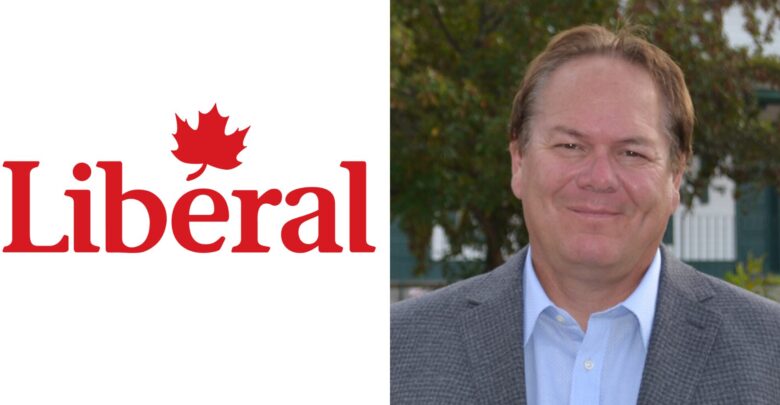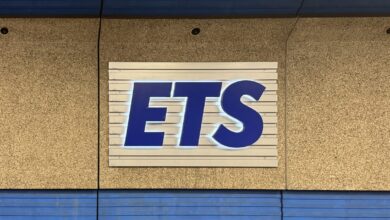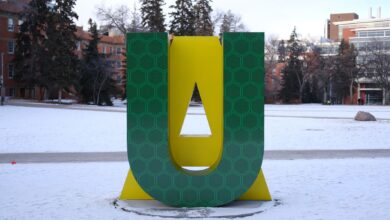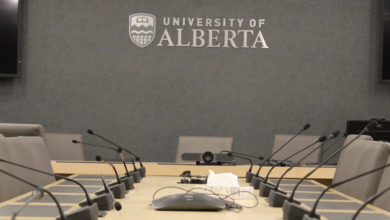Federal election 2025 candidate Q&As: Ron Thiering (Liberal Party)
Ron Thiering, the Liberal Party's candidate for Edmonton Strathcona, runs the Edmonton International Raceway with his wife.
 Leah Hennig
Leah HennigThis article is part of The Gateway’s Q&A series with the 2025 federal election candidates for the Edmonton Strathcona riding.
Ron Thiering is the Liberal Party’s candidate for Edmonton Strathcona. Thiering sat down for an interview with The Gateway to talk about how he and his party would address student issues if elected.
Thiering is a long-time resident of the Edmonton area who has largely worked in the private sector running his own business. He and his wife run the Edmonton International Raceway. Thiering said he’s also been involved in community fundraising.
The following responses have been edited for length and clarity.
Why are you running in this election and in Edmonton Strathcona specifically?
Thiering: Well, it’s kind of a long story, but I originally was going to run in [Edmonton] Gateway, which is the next riding in the south. I had run in Edmonton Wetaskiwin, which [Edmonton] Gateway would have been part of. Of course, there was some redistricting that happened last summer. And Randy Boissonnault, who was the [Member of Parliament (MP)] in Edmonton Centre, decided he wasn’t going to run, and Eleanor Olszewski was originally the candidate here in Edmonton Strathcona. She had run here in 2019, not in 2021. And everybody just kind of got shuffled, the party asked if we wouldn’t mind moving up. I’m very familiar with Strathcona. I got my driver’s license driving down 82nd Avenue, you know what I mean? This is heartline Edmonton. So I’ve been in and out of this neighbourhood since the 70s.
Why am I running? Again, I’m older, I have a lot of life experience that I think I can bring to the table. Public service is really important. The other thing is, I’m a grandfather now, and I wanna leave a legacy for my grandbabies. I want to be able to help shape, form my country.
If elected, you would be responsible for representing many of the students who attend the University of Alberta. What would be your priority in representing those students to your party and the government at large?
Thiering: Well, unfortunately right now, the bread and butter issues that would normally be stuff that we would talk about in the campaign are kind of being hijacked by probably the three words I can give you. Sovereignty, security, tariffs. So lots of voters I’m hearing are talking about that. Now as far as the platforms for students for the Liberals they’ve come out with some basic stuff. I believe that we’ll have more information coming out as the campaign goes along. This sovereignty thing, it has been a big issue and, I believe that without us having a clear [goalpost], and of course the goalpost is being moved constantly. Mr. [Donald] Trump is moving the goalpost here, there, here, there, and it makes it tough to really focus on how we’re gonna deal with this guy.
You know, for instance, the Liberals have made some commitments to housing. They put $10 billion worth of money that they want to have for affordable housing, $2 billion of that they want to put towards student housing. So of course, now that also involves the provinces being involved. And so that’s one of the issues.
The other thing is that [the Liberals] want to continue with the cap on foreign students, which was, you know, a fairly large issue there, you know, roughly a year ago.
Note: The $2 billion for student housing is also for seniors’ housing.
Affordability is a big issue for students, whether that’s the price of groceries or housing. How would you and your party work to address this issue?
Thiering: Well, we’re in that situation now [with[ these threats of tariffs and the tariffs have not helped anybody. They’re not helping us, and certainly not helping young people. But the Liberals are putting programs in place to try to get the cost-of-living so that it’s reasonable.
Now, housing affordability, that’s something that we need to work on. Social housing is really important, student housing is really important. I mean, I think those are things that we as a country have sort of, I don’t want to use the word forgotten, but certainly not given as much priority as we should have. I think that Prime Minister [Mark] Carney is seeing that now. He’s seeing that we need to be working harder on these.
As far as food, we all feel that. We’re all feeling that, the cost of groceries and that’s been an issue since the end of the [COVID-19 pandemic] with inflation and stuff like that. So we’re having to work on that and I think we’re gonna have to rely on ourselves a little bit more internally in Canada. We’re gonna have to work on making sure that we’ve got the supply chains here in Canada and making sure that we don’t necessarily have to bring in groceries and food from outside.
How would you and your party approach financial support for students and post-secondary institutions through things like student loans, grants, or research funding?
Thiering: Well, we had a discussion here in the office yesterday and talking about the cost of tuition and just the overall cost of going into post-secondary education. I’m an older person, I couldn’t imagine entering the workforce with a $30,000, $40,000, $100,000 loan just to get an education.
I think that there needs to be some serious discussion with the stakeholders as far as students and government. If we’re lucky enough to form government, I think that we need to have a national conversation on this. Let’s figure this out once and for all because, if we’re expecting our young people to enter the workforce with massive debt, and then an expensive housing situation, we are putting so many barricades in front of them in order to be successful, and that’s what this is all about. We want to leave a better country for our young people.
The U of A has a French speaking campus, which does receive federal funding. What would you and your party do for French speaking post-secondary students?
Thiering: I think the continuation of what has been done in the past. I’ve been [to Campus Saint-Jean(CSJ)] and I need to learn more about it. Again, I’ve lived in Edmonton for many years and I still need to go there and learn more about it.
What I love about the French language is that it makes us uniquely Canadian. I think that’s a very important thing. Sometimes we don’t realize how lucky we are to be able to have two groups that formed our country and how lucky and how unique that makes us. There are very few countries in the world that have multiple languages as their national languages.
How would you define academic freedom and how would you and your party protect it?
Thiering: You’re meaning in freedom for a professor to speak their mind. Isn’t that what universities are about, I mean, it’s the freedom to speak what you feel, to bring ideas forward, even sometimes if they’re not the most popular ideas. I believe in free speech, and I think that people are intelligent enough, and certainly people who are in post-secondary education, that they need to hear different ideas and that’s how we figure things out, right?
I mean, not everybody has the right answer, but we always need to listen, we need to have an open mind about that. I’m talking to many, many different voters when I’m door knocking here, and even if they’re not voting for me, I still would like to hear what they have to say because that’s important.
You can’t close out other people’s views. They have different life experiences and they’ve come to their conclusions because of their life experience, and I think that’s the same thing with post-secondary education. I think that being able to speak and bring these different ideas forward — that’s what makes us a democracy and what makes us a great country, that we can listen to each other.
How would you and your party support Indigenous communities and students?
Thiering: Well, I’ve never got my Métis status, but my mother is Métis, me, so was my sister. The Liberal government has made a priority out of reconciliation. My sister was in a residential school in Île-à-la-Crosse, which is in northern Saskatchewan. I’ve been, especially when I was younger, we spent quite a bit of time in northern Saskatchewan, because that’s where my mother’s from. And there was a lot of poverty. I think that we need to give the Indigenous communities tools so that they can — if they choose — use the education system to help increase their ability to get themselves out of poverty. They have a lot to bring to Canada, I think that that’s important.
I think that we need to make sure that we have funding and everything’s available. I know my oldest girl — because my mother was Métis — was able to access some programs for her education and so these are the important things that we need to continue to do.




